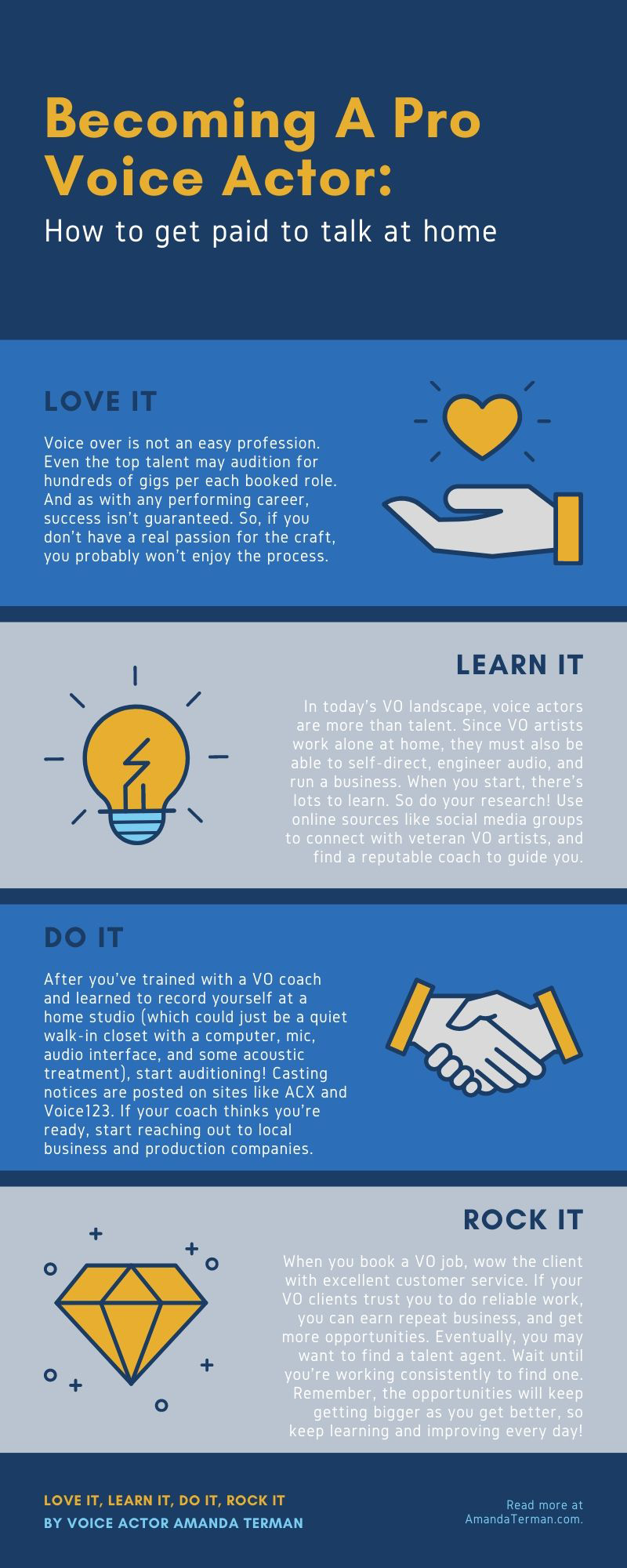How to become a professional voice actor
Summary: In the inaugural post of [A]mandatory Blog, voice talent Amanda Terman shares four tips—and a few warnings—for anyone interested in becoming a voice actor.
Welcome to . . . [A]mandatory Blog!
I’m a full-time voice actor based in Cleveland, Ohio, where I produce broadcast-quality audio for clients around the world. My voice over work is heard in commercials, e-learning, animation, and more.
However, my VOcation surprises people . . . because my voice sounds kinda, ya know, “normal.”
So, when I tell new friends what I do, their first response is usually “Oh, but, ummm, what voice do you use?!?!?”
And I’m like: Ummm, ~this~ one! ¯\_(ツ)_/¯
Then, their curiosity piqued, they want to know how I got into VO . . . and how they can do it, too. So, I thought that would be the perfect topic for my first blog post.
To learn how to become a professional voice actor, keep reading!
Four tips for becoming a professional voice actor
Quick caveat, (or rather, caVOt): Voiceover is a broad industry that includes disparate genres like commercials, e-learning, phone greetings, and animation, and each of these subcategories has different conventions. So, a comprehensive VO startup guide would include more details than I could fit in an entire blog, let alone a single blog post. Still, there are some things that every newbie should know.
So, regardless of whether you want to be the snooty voice in luxury car commercials, or the lewd characters in R-rated cartoons, here are four points to get you started.
To become a VO pro, you must:
Love iT
Voice over is not an easy profession. Even the top talent may audition for HUNDREDS of gigs per each booked role. And as with any performing career—and, like, ANY career—success isn’t guaranteed. So, if you don’t have a true passion for the craft, you probably won’t enjoy the process.
The reality of VO is spending all day alone in your booth, auditioning for dozens of projects that you won’t book (hopefully you’ll get some, but commercials can have 500 submissions per job, so the odds are steep.) Still interested? Then you must . . .
Learn iT
In today’s VO landscape, voice actors are more than talent. Since VO artists work alone at home, they must also be able to self-direct, engineer audio, and run a business. When you start, there’s lots to learn. So do your research! Use online sources like social media groups to connect with veteran VO artists, and find a reputable coach to guide you.
When you connect with pros, be mindful of their time. For example, when you join a social media group, search for previously discussed topics before asking repeat questions. And keep in mind that there is no “right” way to have a career. Everyone will have a different opinion and unique path to success.
Do iT
After you’ve trained with a VO coach, and learned to record yourself at a home studio (which could be just a quiet walk-in closet with a computer, mic, audio interface, and some acoustic treatment), start auditioning! Casting notices are posted on sites like ACX and Voice123, etc. If your coach thinks you’re ready, start reaching out to local businesses and production companies. First impressions are important, so make sure you have professional skills and tools before you claim to be pro talent.
Rock iT
When you book a VO job, give a great performance, of course, but also wow the client with excellent customer service. If your VO clients trust you to do reliable work, you can earn repeat business, and get more opportunities.
Eventually, you may want to find a talent agent. Wait until you’re working consistently to find one. Agents are most interested in talent with a track record of success.
The opportunities will keep getting bigger as you get better, so keep learning and improving ever day.
Bottom line: VO is the literal best . . . but it’s a little harder than “just talking”
It takes a lot of effort to build and maintain a VO business. If you want to try it as a hobby, go for it! But if you’re really serious about starting a new career, there’s no choice but to put in the work.
Voiceover has a lot of perks, but it’s a challenging profession that requires a unique combination of artistry, creativity, skill, business savvy, and determination. There are already a lot of extremely talented voice artists, and since talent and clients can connect remotely via the internet (my studio, for example, is equipped with Source-Connect, phone patch, and video chat for directed sessions), new artists are diving into a talent pool filled with every established pro in the US and abroad.
Work-from-home jobs are EXTRA appealing now in the face of the Covid-19 pandemic and social distancing requirements. But if you’re thinking voiceover may be a quick and easy career pivot, you’ll likely be disappointed.
That being said, voiceover is the literal best, and if you put in the work, opportunities await!
Good luck on your VO journey, and thanks for reading this post!
If you’d like to keep in touch, contact me directly, connect on social (links below), or sign up for my (super infrequent, totally not annoying) e-newsletter.


